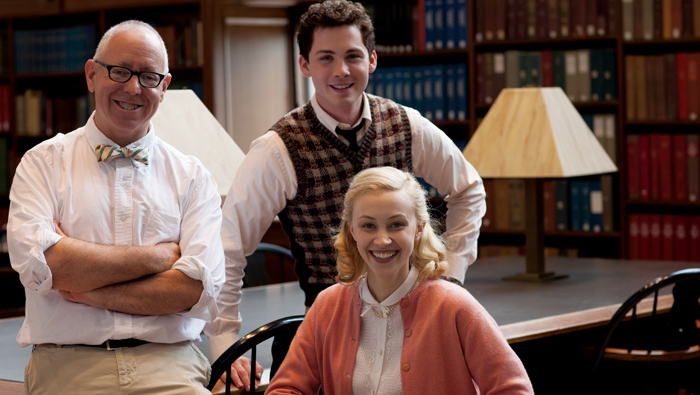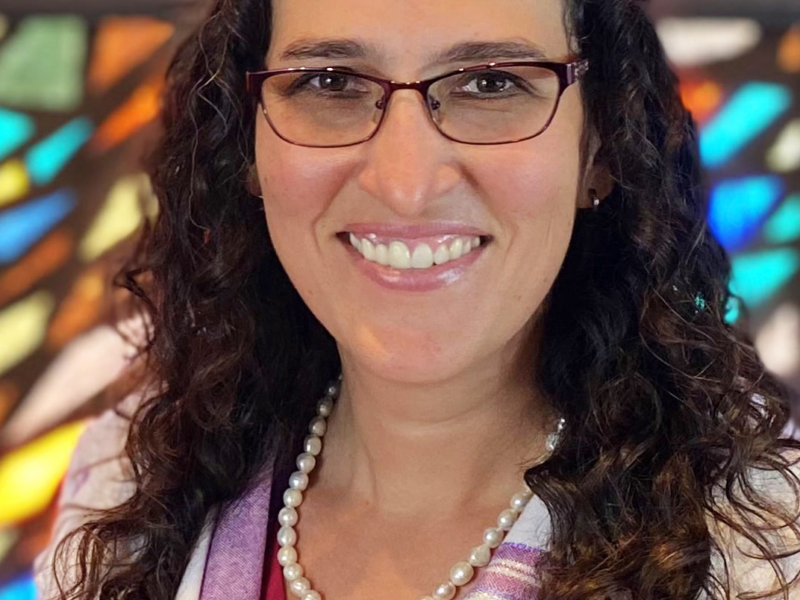James Schamus isn’t one to shy away from a challenge. He proves this point by choosing the autobiographical Philip Roth novel Indignation for his directorial debut. Eight of Philip Roth’s novels and short stories have made it to the big screen, not an easy task based on the complexities of Roth’s work, and not always a successful undertaking. Yet film critics are calling “Indignation” one of the best adaptations of a Roth novel to hit the screen.
When asked why he picked this particular piece Schamus is reflective, “Being a Jewish guy of a certain age, I obviously read (Philip Roth’s novels) Portnoy’s Complaint and Goodbye Columbus, way too young. The weird thing is, every guy like me had the same experience – finding one of those books on the shelf and going ‘What?!’ It was not a developmentally appropriate moment.” But aside from those anxieties from his youth, there was another reason why he picked Indignation, “Honestly, it was the challenge that I loved. That, and the benefit of having been fired from my studio gig, it helped to be unemployed – timing was really kind of everything.”
The “studio gig” he refers to was at Focus Features. He was CEO until 2013. Focus was the studio behind the release of “Brokeback Mountain,” which Schamus also produced. He was also a writer, co-writer or producer on such films as “Crouching Tiger, Hidden Dragon,” “The Ice Storm” and “Hulk.” But Schamus admits that working in the business alongside great directors like Ang Lee and Gus Van Sant does not mean that you are automatically qualified to direct. “I kept my expectations (going into directing) fairly limited. I’ve been on sets for so long, with so many directors, but then again, I’ve had my teeth cleaned a lot too, but it’s not like I’m going to go, ‘I think I’ll clean my own teeth today’ – no, not a good idea,” says Schamus.
Teeth cleaning aside, Schamus made sure he was ready when it was time to start shooting. “I prepped, and I prepped, and I prepped and I didn’t stop prepping until we were shooting,” he explains. “It was a joy – I had a great crew, I had a great cast. We had a very loving set. It was a really tough shoot, really short, we didn’t have a lot of money, we shot in 24 days. But we got there; we got there because we all prepared.”
The star of the film is Logan Lerman, who plays Marcus Messner, a young man who, while many of his friends head off to war in Korea, has received a scholarship and the chance to escape his working-class Jewish family in New Jersey to attend a conservative university in Ohio. “It was fun to be able to have a protagonist that in many ways I identified with. Then of course what you do from there is cast someone who is 10 times better looking than you are, so you can really identify with him. It was great finding Logan – he’s a nice Jewish boy from LA,” reflects Schamus.
Even though good looking and smart, Marcus struggles to fit into his new surroundings. “He is that classic Jewish boy who wants to do good. Straight A student, off on a scholarship and then there is that moment when desire kind of turns you on your head and you don’t have the toolkit for handling it,” Schamus explains of Marcus when he experiences his first sexual experience with the preppy goy, Olivia Hutton, played by Sarah Gadon.
This causes internal angst with Marcus, along with having to attend chapel (he insists he is an atheist) and an altercation with his roommate. Soon, Marcus finds himself summoned by Dean Caudwell (played by Tracy Letts), who tries to find out why Marcus is having such a hard time adjusting, and wants to know more about this Jewish student’s background. It is an emotionally-charged scene that sets the tone for the remainder of the film. “At the same time, that moment of, and I think Logan [Lerman] captures it perfectly, a Philip Roth moment when Philip Roth himself (autobiographically, in fact) finds himself being more Jewish when he is kind of confronting that heritage. It’s not an identity in the way you think that identities should work – as a seamless fit into some pre-determined mold. In fact, being Jewish American often is not fitting that mold and not fitting other molds, but still with that Jewish inflection. And I think, for Roth in particular, he said that he never became more Jewish [than] when he went and did that a little bit with his Jewish background,” Schamus explains of the intense scene. “The greatest thing about a Philip Roth novel – the gift – is that the antagonists are angels of death, but you actually really love them, too.”
When asked what Roth thought about his novel being made into a film, Schamus is candid, “Philip Roth refused to read the script, which was great, I don’t know if he had hated the script, if I could have, in good conscience, gone into pre-production. It was a bit risky to be sending it to him, to be honest. He’s been great. He’s seen the film and has said lovely things about it. He even wrote a statement that the producer read at the world premiere.”
Schamus also reflects on the lack of Jewish characters in films, “Its funny, having the experience of having had distributed “The Pianist” and financed and distributed “A Serious Man” and then looking back and thinking, that’s kind of about it for movies about Jewish people. I mean there are a few more, you can add them up on not much more than one hand. I always found it very odd that I work in an industry, if you haven’t noticed, that there are a few of my fellow Jewish Americans employed – just a smidgen. Yet there is some bizarre, unwritten law that we are never supposed to be making movies about Jewish characters with Jewish themes. I’m sure there is a reason for it, but I couldn’t tell you why. I find it very interesting.”
When asked about his own Jewish roots growing up he explains, “My mom was a Reconstructionist [Jew], it was a pretty LA, the ’60s, Reform temple kind of situation. The cultural winds that were sweeping through our particular corner of the Jewish community in LA at that time were not conducive to a great deal of spiritual searching.” He remains active in the Jewish community today and enjoys the fact that he is being invited to many of his friends’ children’s bar and bat mitzvahs. “I went to a bat mitzvah about a month ago, and I’m singing along, and my friends are like, ‘How are you – what – really?’ I don’t know how I remember the stuff. It’s fun to keep the cultural connections.”
Perhaps this award-winning screenwriter, producer, author, professor (at Columbia University School of the Arts) and now director can change things by bringing more films with Jewish characters to Hollywood. If anyone could do it, he’d be the one up for the challenge.





